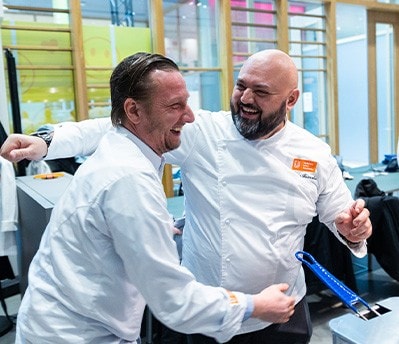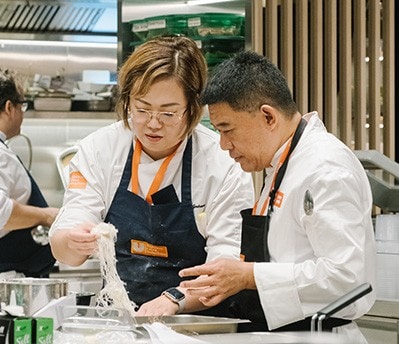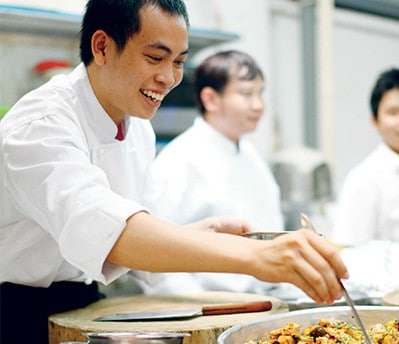When you make a dish, you need to continuously balance and tweak flavours and seasonings, paired with excellent timing to deliver something that your patrons love. The same can be said for building and growing a thriving team in a high-pressure environment, like a kitchen. It takes time, effort, and patience to build and grow your team to become the perfect unit that delivers excellent food and experiences to customers.
Like with seasonal ingredients, or a change in suppliers, there may be changes in your team and how it functions. We’ve got some solid tips and advice to help you, and your team, thrive in the kitchen.
Good Leadership: The Foundation of a Solid Team

Chef Gilles Perrin, Culinary Director of Renaissance Downtown Hotel Dubai, says, “It’s pretty simple: you are nothing without your team.” But building a solid team starts with good leadership as a foundation.
Coovishan Pillay, Executive Chef at Protea Hotel by Marriot, OR Tambo International adds "As a leader, people look at you for strength, people look at you for comfort, people look at you for direction. If you're not calm, you're running around the place not knowing what to do. People start getting stressed. You need to be able to direct, keep calm in situations, and comfort your team members, because if you don't comfort them, it also filters down to your junior team members. I've always believed, as a chef, you can't overreact to certain issues. Because certain issues are beyond your control and sometimes out of your control.”
But being a good leader stretches beyond being a pillar for your team. Great leaders don’t lead without getting their hands dirty; they’re right there alongside their team, leading by example.
“A leader is not just a chef. They become brothers, sisters, mental support, and mentors. Support your team and make them feel protected. Assign roles and tasks based on skills and interests, not experience. This keeps people motivated and engaged. When the pressure is on, focus on the reason you entered this profession and your passion for it. Success hinges on the strength and unity of the team,” says Elissa Aboutasse, Head Chef, Tahini
You should be the leader you wish you had when you started out. For chef Greg Stockdale, leading by example is key to building a great team. “Lead by example to build people up. At all levels. If you're training up your dishwasher, encourage them to do prep with you. Then, at the end of the day if there's a mountain of dishes, jump in and be like 'let me help, let's get this done quicker'. It's a great opportunity to connect.”
Heard, Chef!

Communication is a two-way street as they say, and communication should be able to happen from yourself to your team and vice versa. As a leader, you should make your team feel heard. They shouldn’t be afraid to voice an opinion, ask questions or give feedback.
Kimberly Brock Brown, Executive Chef and President of the American Culinary Federation, shares some great insights about open communication in the kitchen environment: “I know I didn't always feel heard when I was a part of a team, so I think that really made my style of management the way it is now. I want to be heard, and I want other people to be heard as well.
I didn't feel like I knew everything, so I was willing and open to asking my crew, “what do you think?” I ask them to come up with suggestions for some new seasonal things, and everybody gives ideas - because I want them to feel empowered.
It's important to me that my team can feel like they can come to me with ideas and suggestions, but also the leader, the manager has to be receptive enough to take it.”
A Diverse Kitchen is a Creative Kitchen

A kitchen can be a hot pot of diversity, and leaders should celebrate and embrace this. You get the opportunity to understand how different cultures work, and it opens up doors to change how your do things in the kitchen to allow for your team to feel included, respected and valued from the get-go.
Zana Alvarado, Chair of SA Chefs Association explains diversity and inclusion in a kitchen environment so well: “A fair kitchen promotes tolerance. Make the effort to learn about the cultures of the people you work with. Protect diversity and inclusion by having a strict anti-discrimination policy, which all employees know about. Train staff members about their rights and responsibilities. Nurture respect through courtesy. When everyone understands the value of a healthy working environment, they will feel a part of something great.”
You might also like: Why Diversity is Good for a Positive Kitchen Culture
Upskill Your Team
Training and development may feel like necessary tick boxes for any leader, and face it, your team may not be looking forward to it either. But what if you rephrase it or turn it into opportunities to learn and make it more fun?
Joe Tripodi, Director of Food and Beverage, Buck Hill Falls says that they have a culinary training calendar, and the team learns something new every day. “We throw a ‘battle of the chefs’ in it, which is really fun and gets everyone involved, from dishwasher to cook. Each person receives a mystery basket to create a meal from, and half way through we throw in a surprise ingredient to use. It fosters creativity and teamwork - and keeps everyone on their toes!”
This training approach works in two ways: allowing your team to be creative and learn something new, and it gives them opportunities to feel more involved, as they have the chance to not just stick to their job title – you may even spot some growth opportunities in the process.
Looking to upskill your team? Check out our free courses at UFS Academy.
Back to Basics: Treat Staff Well
Treating your staff well should just be how things are. Kitchens are challenging environments as it stands and treating people well, will make the kitchen a more positive place to be and motivate your team to deliver.
Amanda Fuller, Group Executive Chef of Sam Prince Hospitality Group concludes that "treating people equally, giving them responsibility and respect gets the best results out of them. Good conditions, happy staff members, flexibility, a sense of respect, and inclusivity - these should be the norm.”
But treating your team well goes beyond equal treatment. You should look at it holistically – wages, incentives and work-life balance also play important roles in how people perceive to be treated at work.
"It’s important that your team feels valued. If you want to keep your staff, it's not just about raising wages, it's about the full employment package. Are you investing in development? Do you have the progression of your chefs at the front of your mind? What's your approach to stress, long working hours, and the challenges of working in a busy kitchen? Do you listen to your chefs? How do you ensure ‘I'm happy at work’? All of these things have always been important, but now more than ever, people are paying attention to what's important to themselves, as people and not just as professionals," adds Max Brent, Director of The Chef Partnership
Look at what your team needs and start to create a working environment that doesn’t just support your staff, but also allows them to thrive at work.
VIDEO: TREATING STAFF WELL
Focus on Your Teams’ Mental Health and Wellbeing
The long hours, physical demand on bodies and pressure can all play a role in the mental wellbeing of your team. In a working environment like a kitchen, mental health and work-life balance should be the top priority.
Luciana and Sebastian Pasinetti, Owners of Oko, want to make sure that their team is empowered: “The mental wellbeing of our team is important to us. We implemented a ‘traffic light system’ where staff need to rate their wellbeing before each shift, this way we are able to provide them with the support that they need to get through the day.
We have seen that the hospitality industry can have an unhealthy work-life balance. We wanted to have our own restaurant where we could create more structure for our staff and ensure that they could still have a life outside of work. By implementing and prioritising a mental health policy across the company, we hope to reduce the stigma around mental health conversations within the workplace and create a space that changes the culture of the hospitality industry.”
But what could a mental health policy feasibly look like? This could include a buddy system like Sherif Afifi, Executive Chef, Unilever Food Solutions explains: “You can make your working environment healthier with small changes. Speak to your manager about what makes you anxious about your daily work routine. Choose a colleague to be a wellbeing partner to share your struggles and motivate each other. Plan work efficiently. Focus on the present and what you can control.”
Looking after your team’s mental health can also include group mindful meditation sessions, as Emmanuel Stroobant, Chef and Owner of Saint Pierre, explains: “Working in a MICHELIN-Starred restaurant demands a constant pursuit of perfection. I am a big believer that mindful meditation can activate the brain to better adapt to stressful or negative situations. I take both my front and back of house team through a 5–8-minute breathing meditation every evening before dinner service.”
The key is to remember that there is still much to be done about the perception of mental health in kitchens.
"For a long time, we've accepted the stereotype of chefs needing to be strong and thick-skinned and not show any 'weakness'. Thankfully, this is changing. Speak to someone, get it off your chest. Surround yourself with positive people. Breed positivity and you will receive positivity,” says chef Dion Vengatass of Violet by Vengatass
Be an Agent for Positive Change
There are many ingredients that you as a leader can incorporate into creating a thriving team. From good leadership to motivation and incentives, you now have insights that you can use to be an agent for positive change in your kitchen and restaurant.
Need help to level up your leadership skills? Check out our free Leadership Training at UFS Academy.